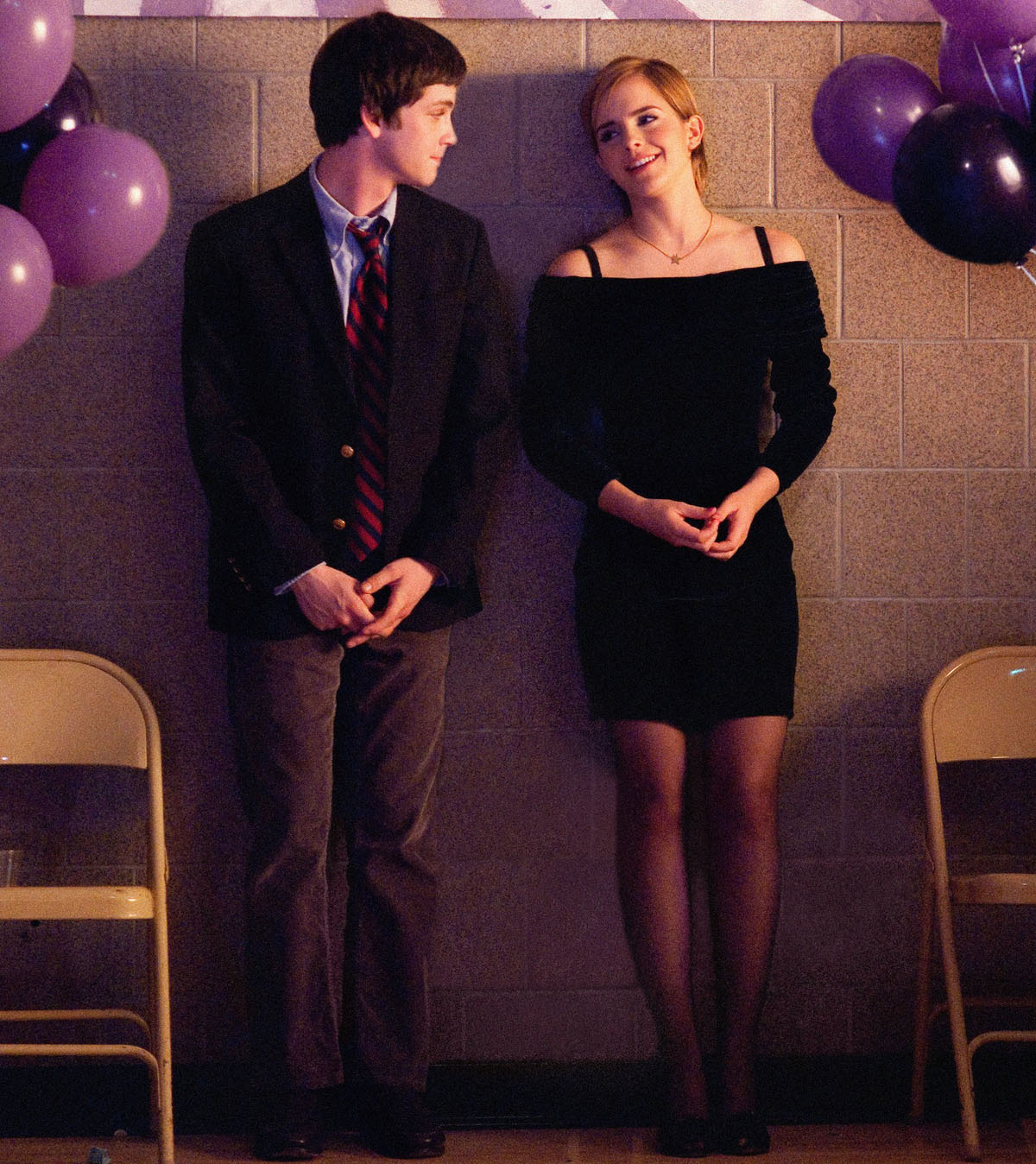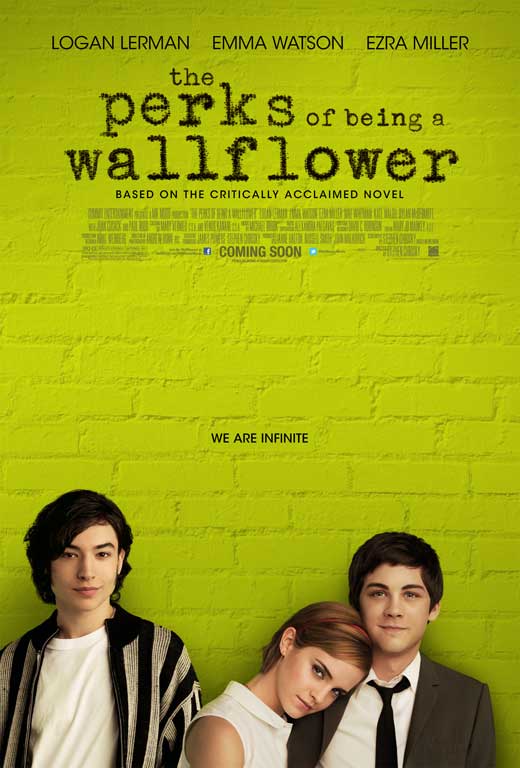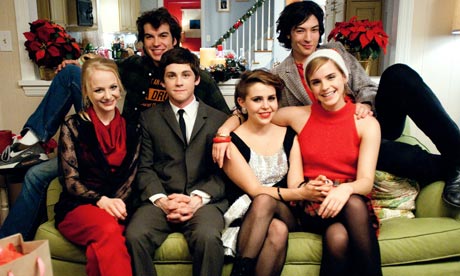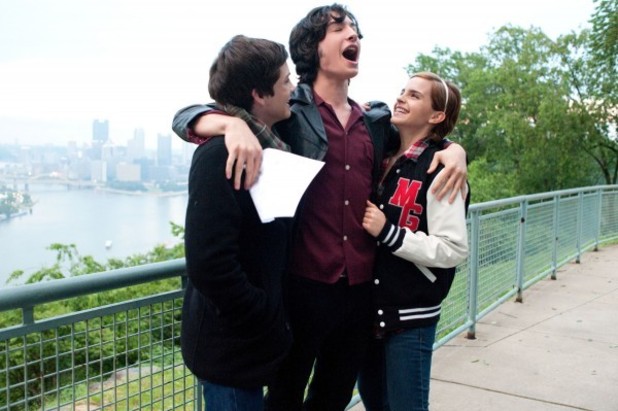The Perks of Being a Wallflower
I know I already harped on enough about how Silver Linings Playbook deserved all those Oscar nominations, but here's a film that just might have deserved to be included even more. And, oh yes, this is going to be a long one - but the film deserves a more in depth discussion.
As adults, we have a habit of looking back at our adolescent years with a mixture of embarrassment and contempt as we scoff at problems that seemed so big then but seem so small now. And yet, for all that we may cringe at our past predilections for over-inflated emotional outbursts and many, many laughable pretensions, in a sense we are never more real and more honest than we are as teenagers. Like the best coming of age stories, The Perks of Being a Wallflower hones into this truth with expert precision as it beautifully and perfectly captures the tempestuous mix of egotism and idealism of the average Western teenager, while never overlooking the real pain, awkwardness and red-hot emotional turmoil that makes teenage angst far more than something just to be scoffed at as we grow older and more cynical.
Based on the beloved novel of the same name and, in a fairly ingenious move, adapted for screen and directed by its author, Stephen Chbosky, Perks is the kind of film that is too human to be perfect and too emotionally raw, too profoundly relatable and just too damn heartfelt to be anything but an enduring classic that will far outlive some of the more lukewarm reviews it has received from stuffy middle aged critics.
Perks tells the story of Charlie (Logan Lerman), an introverted and emotionally perturbed freshman who, before even tackling the tricky waters of high school, has already had to deal with the suicide of his best friend and the untimely death of his favourite aunt, which has in itself resulted in such severe psychological breakdowns that he had a prolonged stay at a mental hospital. So far so melodramatic, but, to Chbosky's great credit, he uses the exaggerated, if not unrealistic, aspects of Charlie's personality to emphasise certain aspects of adolescence without making Charlie a silly caricature - he's anything but - or, for that matter, over-emphasising his problems over those of his contemporaries.
Based on the beloved novel of the same name and, in a fairly ingenious move, adapted for screen and directed by its author, Stephen Chbosky, Perks is the kind of film that is too human to be perfect and too emotionally raw, too profoundly relatable and just too damn heartfelt to be anything but an enduring classic that will far outlive some of the more lukewarm reviews it has received from stuffy middle aged critics.
Perks tells the story of Charlie (Logan Lerman), an introverted and emotionally perturbed freshman who, before even tackling the tricky waters of high school, has already had to deal with the suicide of his best friend and the untimely death of his favourite aunt, which has in itself resulted in such severe psychological breakdowns that he had a prolonged stay at a mental hospital. So far so melodramatic, but, to Chbosky's great credit, he uses the exaggerated, if not unrealistic, aspects of Charlie's personality to emphasise certain aspects of adolescence without making Charlie a silly caricature - he's anything but - or, for that matter, over-emphasising his problems over those of his contemporaries.
Like Freaks and Geeks (a truly brilliant TV series from the late '90s that, to the best of my knowledge, was never broadcast in South Africa and is still unavailable on Zone 2 DVD, but is well worth hunting down) and the films of John Hughes before it, Perks focuses its attention on misfits and outcasts, but the film makes it clear that even if few have quite the baggage that Charlie has to deal with, adolescence is tough on everyone, from football players, to the class clown to, yes, that kid sitting in the back of the class who never speaks.
Admittedly, this wasn't entirely clear on my first viewing of the film. At first glance, Chbosky does seem to be drawing a rather disturbing causal relationship between quietness/ introversion and trauma-derived mental illness, but on a further viewing of the film and reading the novel, that no longer seems to be remotely the case. If anything, the opposite seems true. Not only is Charlie's introversion and his emotional and psychological problems separate from one another, but Chbosky portrays the former as a great strength, while it is only the latter that truly stands in the way of happiness and self-fulfillment.
Unsurprisingly, it is when Charlie starts to form connections with those around him that he is at long last set on the road to self-discovery and, finally, healing from his early traumas - though with many a social faux pas along the way. Not because he suddenly discards his quiet, wallflower personality, as some critics of the film seem to bewilderingly suggest, but by finding common ground with similarly flawed but worthwhile individuals.
First, his English teacher, Bill (Paul Rudd in wonderfully understated form), takes a great interest in Charlie as he quickly sees the smart-beyond-his years and insightful young man that lies beneath the young introvert's quiet exterior. It doesn't take much more than a few encouraging words and the passing on of some of his favourite novels for Bill to become a mentor and a confidante to Charlie.
Even more importantly, Charlie finally finds a place where he truly belongs as he strikes up an unexpected friendship with a couple of hipster-ish, step-sibling seniors, Patrick (Ezra Miller) and Sam (Emma Watson) whose love for slightly left-field pop music and free-spirited living appeals to Charlie, as much as their own dysfunctions and social problems connects them on even deeper levels. Crucially though, for all that they could have descended into annoying "hipster" or, heaven help us, "troubled outsiders" stereotypes, Patrick and Sam are fully rounded characters that win over the audience as quickly as they - especially Sam - beguile Charlie.
It's hard to overstate just how great a job Chbosky has done with making these three central teenagers - as well as the half dozen or so others that form the rest of their social group - realistic and relatable human beings with whom we can laugh and cry - even as we might, on occasion, want to strangle them. Even the way they talk to one another feels entirely authentic. Yes, much of the dialogue can be seen as heavy handed, pretentious and "Hollywoodized", but that just feels like an extension of the pretentious, precocious and, yes, occasionally maddeningly "knowing" characters. But then, that's the incredible thing about The Perks of Being a Wallflower. It often comes dangerously close to committing some cardinal storytelling sin, but it always manages to turn those moments on their heads and comes out all the stronger for it.
Indeed, it is precisely those moments that show off not only Chbosky's skills as a writer, but his impressively unfussy direction as well. He may not have the visual or stylistic ticks of many of today's best directors, but his ability to elevate the film when it could so easily fall flat on its face says a lot about just how natural a storyteller he is.
And then, of course, there are the performances that he gets out of his actors. Paul Rudd is reigned in and is all the better for it, while Dylan McDermott steps up as the surprising comic anchor of the film. I've never been overly impressed with McDermott in his severe, leading man of The Practice guise, but between this and being by far the best thing in the otherwise underwhelming The Campaign, he's proving himself to be a very fine comedic actor.
 Most importantly and best of all, though, is just how great the film's younger actors are. The supporting cast, including Mae Whitman and Johnny Simmons are rock solid, but it's the film's three central leads that are most impressive. Ezra Miller has already proven to be an excellent and versatile young actor after a stunning turn in We Need to Talk About Kevin and some fun short appearances on Californication and, though I already thought that Emma Watson really stepped up to the plate for the last few Harry Potter films, her performance here - with an American accent no less - should put paid to the nonsense that she can't act. As for Logan Lerman, he's actually been in quite a bit, according to his IMDB page, but as far as I'm concerned, he's pretty much a shoe in for this year's best newcomer award. The whole film rests on his young shoulders, but, boy, was he up to the task.
Most importantly and best of all, though, is just how great the film's younger actors are. The supporting cast, including Mae Whitman and Johnny Simmons are rock solid, but it's the film's three central leads that are most impressive. Ezra Miller has already proven to be an excellent and versatile young actor after a stunning turn in We Need to Talk About Kevin and some fun short appearances on Californication and, though I already thought that Emma Watson really stepped up to the plate for the last few Harry Potter films, her performance here - with an American accent no less - should put paid to the nonsense that she can't act. As for Logan Lerman, he's actually been in quite a bit, according to his IMDB page, but as far as I'm concerned, he's pretty much a shoe in for this year's best newcomer award. The whole film rests on his young shoulders, but, boy, was he up to the task.
Look, I understand, that Perks might not resonate quite so much with some audiences as it did with me (though, for the record, the critics that I saw it with seemed to be universally positive about the film) but I can't imagine how anyone could be anything but moved by this truly excellent coming of age story. It really shouldn't be that hard to channel your awkward inner teenager.
First, his English teacher, Bill (Paul Rudd in wonderfully understated form), takes a great interest in Charlie as he quickly sees the smart-beyond-his years and insightful young man that lies beneath the young introvert's quiet exterior. It doesn't take much more than a few encouraging words and the passing on of some of his favourite novels for Bill to become a mentor and a confidante to Charlie.
Even more importantly, Charlie finally finds a place where he truly belongs as he strikes up an unexpected friendship with a couple of hipster-ish, step-sibling seniors, Patrick (Ezra Miller) and Sam (Emma Watson) whose love for slightly left-field pop music and free-spirited living appeals to Charlie, as much as their own dysfunctions and social problems connects them on even deeper levels. Crucially though, for all that they could have descended into annoying "hipster" or, heaven help us, "troubled outsiders" stereotypes, Patrick and Sam are fully rounded characters that win over the audience as quickly as they - especially Sam - beguile Charlie.
It's hard to overstate just how great a job Chbosky has done with making these three central teenagers - as well as the half dozen or so others that form the rest of their social group - realistic and relatable human beings with whom we can laugh and cry - even as we might, on occasion, want to strangle them. Even the way they talk to one another feels entirely authentic. Yes, much of the dialogue can be seen as heavy handed, pretentious and "Hollywoodized", but that just feels like an extension of the pretentious, precocious and, yes, occasionally maddeningly "knowing" characters. But then, that's the incredible thing about The Perks of Being a Wallflower. It often comes dangerously close to committing some cardinal storytelling sin, but it always manages to turn those moments on their heads and comes out all the stronger for it.
And then, of course, there are the performances that he gets out of his actors. Paul Rudd is reigned in and is all the better for it, while Dylan McDermott steps up as the surprising comic anchor of the film. I've never been overly impressed with McDermott in his severe, leading man of The Practice guise, but between this and being by far the best thing in the otherwise underwhelming The Campaign, he's proving himself to be a very fine comedic actor.
 Most importantly and best of all, though, is just how great the film's younger actors are. The supporting cast, including Mae Whitman and Johnny Simmons are rock solid, but it's the film's three central leads that are most impressive. Ezra Miller has already proven to be an excellent and versatile young actor after a stunning turn in We Need to Talk About Kevin and some fun short appearances on Californication and, though I already thought that Emma Watson really stepped up to the plate for the last few Harry Potter films, her performance here - with an American accent no less - should put paid to the nonsense that she can't act. As for Logan Lerman, he's actually been in quite a bit, according to his IMDB page, but as far as I'm concerned, he's pretty much a shoe in for this year's best newcomer award. The whole film rests on his young shoulders, but, boy, was he up to the task.
Most importantly and best of all, though, is just how great the film's younger actors are. The supporting cast, including Mae Whitman and Johnny Simmons are rock solid, but it's the film's three central leads that are most impressive. Ezra Miller has already proven to be an excellent and versatile young actor after a stunning turn in We Need to Talk About Kevin and some fun short appearances on Californication and, though I already thought that Emma Watson really stepped up to the plate for the last few Harry Potter films, her performance here - with an American accent no less - should put paid to the nonsense that she can't act. As for Logan Lerman, he's actually been in quite a bit, according to his IMDB page, but as far as I'm concerned, he's pretty much a shoe in for this year's best newcomer award. The whole film rests on his young shoulders, but, boy, was he up to the task.Look, I understand, that Perks might not resonate quite so much with some audiences as it did with me (though, for the record, the critics that I saw it with seemed to be universally positive about the film) but I can't imagine how anyone could be anything but moved by this truly excellent coming of age story. It really shouldn't be that hard to channel your awkward inner teenager.






Comments
Post a Comment